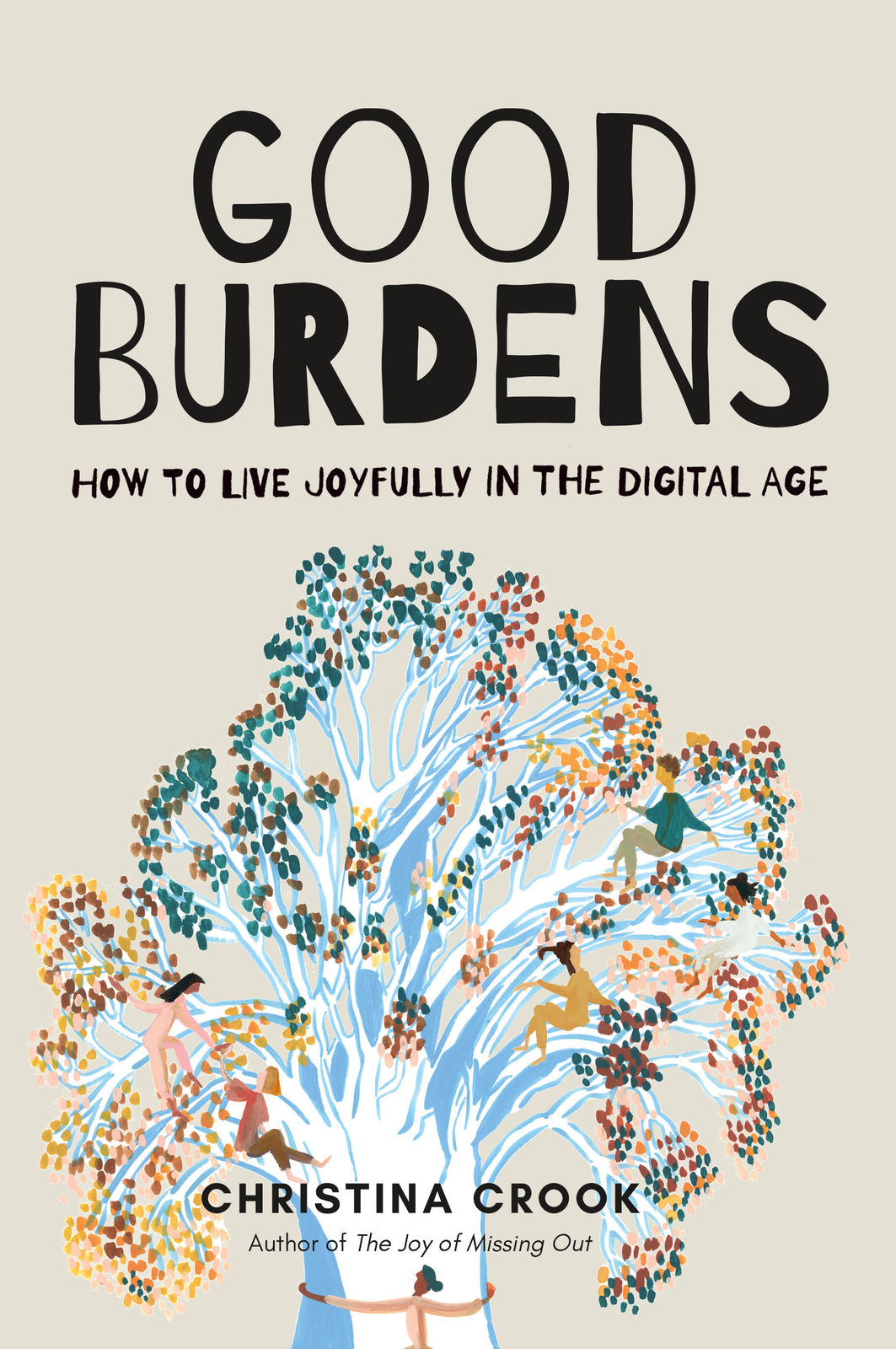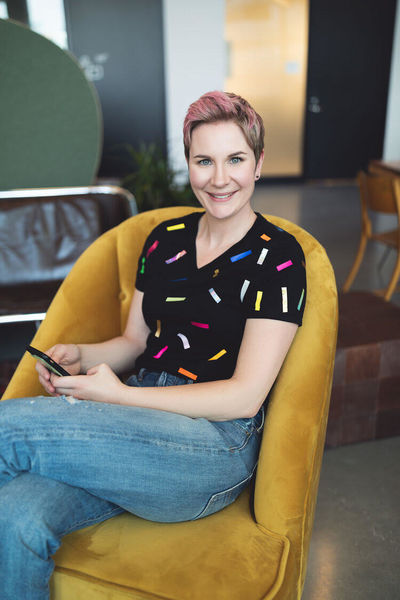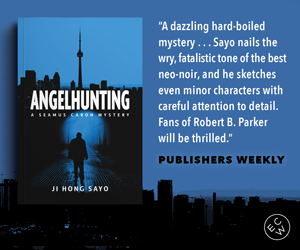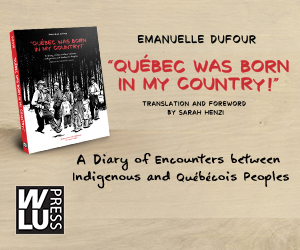Book Therapy: Good Burdens
By Stacey May Fowles
“You may feel like you’re behind the rest of the world because you haven’t accomplished your to-do list or gotten to inbox zero or have your side hustle rocking like your neighbour next door. (Newsflash, neither does he.) But I’m going to let you in on the great secret.
You are not behind. You are becoming.”
—Christina Crook, Good Burdens
As I write this, I’m on yet another social media break.
Like most, it’s been well over a decade that I’ve been living socially online (more if you count MySpace and Friendster) and I still haven’t really figured out a healthy way to do so. All of the standard well-worn complaints about digital life apply here; though I like to stay connected and informed, I hate the feeling of obligation, the stress, the harassment, the abuse, the divisiveness, the awkwardness, the fighting, the distraction, the time suck, and the fact that we’re all a bunch of data points clicking around for corporate profit.
Beyond that, I hate the ugly emotions and behaviour social media can provoke, especially when we’re already feeling vulnerable—envy, insecurity, anger, and that all-consuming feeling of not being or doing enough. All of this was frustrating enough for me to quit Twitter near completely a few years back, yet I still cling to Instagram in the hope of positive human interaction and adorable animal videos. (To be fair, both definitely happen enough to make me stay.)
Better people than I seem to have been able create online habits that feed their relationships, souls, and careers without feeding their anxiety (there’s that envy popping up again), but I admit I haven’t quite mastered it. While I know there’s a million things I could be doing other than looking at pictures of Keanu Reeves and recipes for one-bowl mac and cheese, I am weak. It’s not rare that I find myself mindlessly logging on, falling into a toxic pit of binge scrolling, and then feeling bad about myself, my productivity, and my general life choices. Once I’ve reached a certain peak level of bad feelings, I usually yell, “WHY AM I EVEN ON HERE,” and hide my phone away until I feel better enough to return.
And then I start the whole terrible process all over again.
Being a writer in the world seems to necessitate an “online presence” (gulp) and so I have read countless books on how to remedy my dysfunctional love/hate relationship with my phone. This urgency to learn how to become a better scroller only increased with the pandemic, when my dependence on my device was exacerbated by the absence of nearly all the people I care about.
Reading pages and pages of social media wellness texts, I’ve learned about why I should set screen time limits, carefully curate and unfollow, delete my accounts from my homescreen, and how by looking at my friend’s vacation photos and outfits of the day I’m fuelling the great, greedy corporate machine. I’ve been advised to take my phone off the dinner table, off the nightstand, leave it downstairs, in my purse, at home, and even in a timed lock box. I’ve been instructed to take all these drastic measures when really I just want one relatively simple thing—to finally learn how to not care so damn much about what’s going on online.
It is for this reason I was immediately attracted to Christina Crook’s Good Burdens, a book that advises “how to live joyfully in the digital age.” This slim manual on better living begins with a rather lofty promise; “Good Burdens will not teach you how to break up with your phone or pawn off cheap life hacks to prove you can get things done. Instead, you’re going to learn how to stop living your life on autopilot and start living a life so wild and good, so brimming with joy, your screens will dim in comparison.”
Part memoir, part instruction manual, part workbook, Good Burdens encourages you to do a vital thing to solve your digital woes; increase the intentionality in your day-to-day life. It’s subject matter that award-winning author Christina Crook has devoted her own life to; she’s already known for the book The Joy of Missing Out: Finding Balance in a Wired World, the JOMO(cast) podcast, and what is referred to as “the global #JOMO movement,” or “embracing the joy of missing out to thrive in a rapidly changing world.”
Your CanLit News
Subscribe to Open Book’s newsletter to get local book events, literary content, writing tips, and more in your inbox
The focus on intentionality in Good Burdens means more than just having the willpower to end all that aforementioned mindless scrolling—instead it means thinking long and hard about where we want our energies to be going and why, and working even harder to cultivate the relationships, pursuits, and projects that bring us genuine happiness. In short, it means taking up the kind of good burdens the title suggests.
“My dearest hope is that this book teaches you to love, to know that caring for your small corner of the world matters, and helps you channel your energies online and off toward good burdens…”
It’s certainly a beautiful concept, but how exactly do we do that?
Conveniently, Crook includes a handful of assignments at the end of each chapter, some deep and meaningful, others light and amusing, each outlining ways to make room for more personal satisfaction far away from that addictive daily digital churn. As you might have already guessed, gratitude comes up time and time again in Crook’s prescriptions, as does consciously recognizing the places and people who bring you genuine joy. She also asks some hard questions about the life you’re living now—and how you might want it to change.
What have you been avoiding? In what areas of your life would you like to improve? When you imagine a good life what do you see?
The goal here is to clear out all those mindless activities—like the average 118 minutes a day human beings spend on social media—to make room for the things that really feed us.“Distractions keep you from doing what you want to do, being who you want to be, wanting what you want to want,” she writes. “What do you do when you pay attention? You pay with all of the lives you could have lived.”
Some of the things Crook encourages her readers to do may, on the surface, seem a bit silly. In our busy, over-scheduled lives, it can seem like a waste of our very precious time to “go out and look at the sky or “learn the name of one new neighbour.” But embedded in these simple directives is something bigger—the mission to notice the world beyond the limits we’ve imposed (digital and otherwise,) to let go of what has long been weighing us down, and ultimately to seek something better.
“The beginning of this decade was a nightmare and a crucible,” writes Crook. “It showed us what is essential and non-essential in our lives. Now is the opportunity to ask yourself: what will I carry forward with me? What will I leave behind?”
While tossing away my phone, I’ve certainly asked myself the very questions that Crook poses. I have struggled to move forward in a way that feels authentic to my experience of these last few years, and have grappled with what the future will look like if I actually leave all the familiar distractions behind.
But even if I don’t yet know how to live the life I want, online and otherwise, I am certainly willing to take on the good burden of finding out.
Book Therapy is a monthly column about how books have the capacity to help, heal, and change our lives for the better.
The views expressed by Open Book columnists are those held by the authors and do not necessarily reflect the views of Open Book.
Stacey May Fowles is an award-winning journalist, novelist, and essayist whose bylines include The Globe and Mail, The National Post, BuzzFeed, Elle, Toronto Life, The Walrus, Vice, Hazlitt, Quill and Quire, and others. She is the author of the bestselling non-fiction collection Baseball Life Advice (McClelland and Stewart), and the co-editor of the recent anthology Whatever Gets You Through (Greystone).




